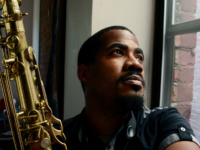feature photo: Diane Allford
Every album by the saxophonist and composer James Brandon Lewis is a venture into an aspect of his unbound intellectual inquisitiveness. Jesup Wagon (May 7, 2021 by Tao Forms) explores the life and accomplishments of America’s most prominent botanist, George Washington Carver. But Carver was much, much more than a botanist; he was an inventor, educator and — like Lewis — an artist, who could paint and play several instruments. It’s that melding of art and science (and a keen curiosity) that draws Lewis to Carver and inspired Lewis to construct a set of songs that speak to the greatness of a major figure in African-American history. The ‘Jesup Wagon’ was a vehicle that Carver used to spread his innovations in agricultural methods to the Black farmers of the Alabama countryside around Tuskegee Institute in the early 1900s where Carver taught, researched and innovated for most of his life.
For Jesup Wagon, Lewis unveils the Red Lily Quartet, perhaps his most impressive band yet: William Parker (bass, gimbri), Kirk Knuffke (cornet), Chris Hoffman (cello) and Chad Taylor on drums. It’s not just about the talent, it’s knowing what to do with it, and Lewis has an innate sense of how to best deploy it in the service of his overall vision.
“Jesup Wagon” kicks off with Lewis alone, playing his sax not like any other sax player, but akin to singing a spiritual through his horn. That sets the stage for the rest of the band, keyed on Taylor’s loosened second-line march. The ingenuity in Lewis’ arrangement is already coming into view in the form of Hoffman’s repeating figure fitting right inside of the drums as Knuffke creates. After a brief theme statement, Lewis’ wholly original solo keeps nudging outside until he finally breaks free. The whole thing manages to reach back over a hundred years and forward at the same time.
Hoffman’s simple circular figure along Parker’s use of a gimbri — a 3 stringed lute originating from Morocco — and Taylor 12/8 pulse places “Lowlands of Sorrow” culturally far from Carver’s Alabama environs, reaching straight back to Africa. That’s just what Lewis intended, to make a point about transatlantic human misery.
“Arachis” traces the life cycle of the peanut, as our understanding of the legume is largely because of Carver, and it’s flowering exemplified by Lewis’ stimulating one-on-one with Taylor. Knuffke and Parker have tough acts to follow but acquit themselves well.
Lewis and Knuffke delight in point/counterpoint for “Fallen Flowers,” and Taylor’s nimble high-hat/rim rhythm keeps the proceedings snappy but light-footed as Parker and Hoffman engage in their own stimulating exchanges. “Seer” starts with the treat of Hoffman and Parker combining to create the song’s current as Taylor complements them on mbira and the two horns finesse around and with each other.
“Experiment Station” strikes a delicate balance of chamber gracefulness and collective freedom in an Ornette-esque fashion. The Ornette Coleman influence is more explicit on the “Lonely Woman” close relative “Chemurgy,” but Lewis charts a distinctively African undercurrent for it, again bolstered by the presence of Parker’s gimbri. Knuffke and Lewis, meanwhile, engage very attentively with each other and if you listen closely enough, chanting can be heard in the background. It’s the kind of song that’s made for chanting, after all.
It’s hard to call Jesup Wagon James Brandon Lewis’ major statement, because every record he makes is a major statement. But until he puts forward his next epic, this epic will do just fine. Jesup Wagon feels just like the musical embodiment of George Washington Carver.




